How to Fix Dull Spot on Quartz Countertop (6 Ultimate Ways)
If not maintained properly, quartz countertops can gradually develop dull spots. These blemishes can be tough to get rid of, especially if you can’t identify the root causes and the proper way to mitigate the ... Read more The post How to Fix Dull Spot on Quartz Countertop (6 Ultimate Ways) appeared first on Arthitectural.
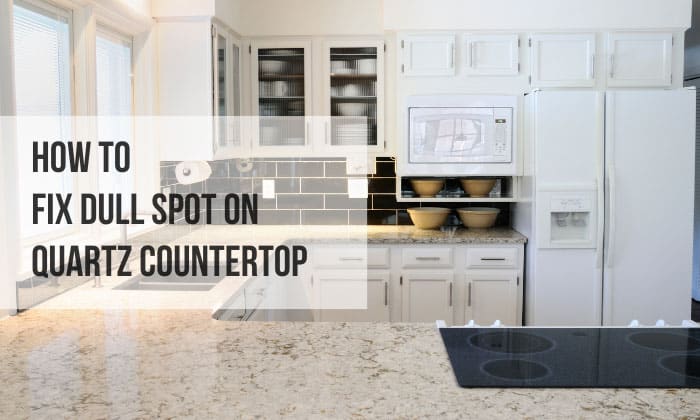

If not maintained properly, quartz countertops can gradually develop dull spots. These blemishes can be tough to get rid of, especially if you can’t identify the root causes and the proper way to mitigate the issue.
Fortunately, it’s not difficult to learn how to fix dull spot on quartz countertop. It also helps that many of the tools needed to make quartz countertops shine are common household items.
Ways to Fix Dull Spot on Quartz Countertop
#Method 1: Baking soda paste
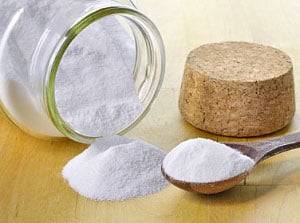
Baking soda is one of the common choices for cleaning quartz surfaces. Although not a particularly harsh chemical, this household item can tackle tough blemishes, water stains, and restore quartz countertop.
- Mix warm water and baking soda until they form a thick paste.
- Apply the paste to the dull spot on granite countertop.
- Use a soft sponge to scrub the affected surface until you’re satisfied with the result. Note that you should not use a tough-bristled brush, which can make the stone surface look duller.
- If left too long on quartz, baking soda can be counterproductive, so rinse the countertop with warm water again to remove all traces of the powder. You can also pour a few drops of mild soap, such as dish soap, for good measures.
#Method 2: Diluted vinegar
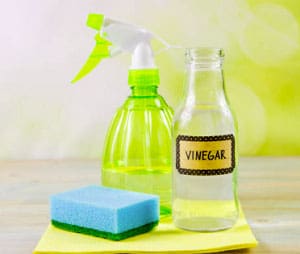
One thing to keep in mind when using vinegar to eliminate quartz countertop dull spots is that the substance is acidic. So you should never use undiluted vinegar on the stone surface; otherwise, you can cause the countertop to discolor even further.
- Combine water with white or apple cider vinegar in a 3:1 ratio. You can also add a few drops of essential oil for a pleasant fragrance.
- Spray the solution onto the countertop and let it sit for a while.
- Wipe away the vinegar mixture with a soft cloth.
- Check if the dull spots on quartz have disappeared. If they have, carefully clean the countertop with water again. If they haven’t, repeat the steps above or move on to another method.
It’s also possible to substitute vinegar with hydrogen peroxide and adjust the mixture ratio to 1:1.
#Method 3: Rubbing alcohol
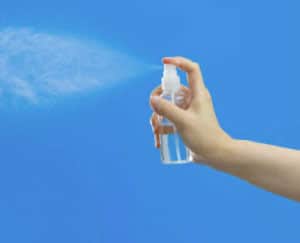
To eliminate stubborn white spots on quartz countertops, consider opting for rubbing alcohol. This approach will have the added benefit of disinfecting your countertop and eliminating unpleasant smells.
- Apply 60-61% rubbing alcohol to a clean rag.
- Scrub until you get rid of dull spots on the quartz.
- Clean the area again with warm water. By now, your countertop should look shiny and spotless.
#Method 4: Specialized stone surface cleaners
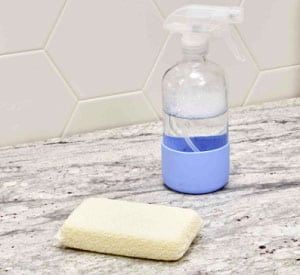
When your quartz countertop looks cloudy, you can restore its beautiful sheen with stone surface cleaners, such as Weiman quartz cleaner. Specialized products like these will make silestone shine again without damaging the material like some other abrasive substances, thanks to their pH-neutral formula.
- Apply the cleaner to the quartz countertop.
- Use a soft cloth to wipe the surface until the stone regains its shine.
Another noteworthy quartz polishing cream is Bar Keeper’s Friend. Similar to Weiman, this quartz polishing compound is pH-neutral and will not harm the material. You can use it in the same manner as you would with the above product.
Alternatively, you can use glass cleaners as a substitute. However, as these formulas can be more abrasive, you should only spray a small amount of this polish for quartz countertop and wipe away all the glass cleaner residues once you’re done.
#Method 5: Magic Eraser
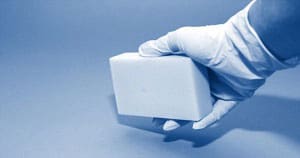
Like vinegar, Magic Eraser can be rather abrasive—this means it’ll be more than sufficient to combat cloudy patches on your countertop. In fact, it’s so effective that if there are any stains it can’t remove, then nothing will.
In case you’ve heard that Magic Eraser dulled quartz or scratched its surface, worry not. This cleaner will not cause harm to your stone countertop whatsoever. On the contrary, it can even remove minor rough spots on the quartz.
- Mix warm water with mild soap.
- Soak the Magic Eraser in the prepared solution.
- Rub the cleaning block in circular motions. Remember to refrain from using too much force and limit your scrubbing to small areas only. If the Magic Eraser gets too dry, dip it again in the soapy mixture.
- Once the quartz countertop is spotless, rinse the surface again with clean water.
#Method 6: Refinish Quartz Countertops
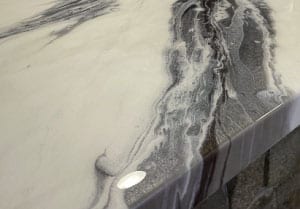
Sometimes, the dull spots on your quartz countertops may be signs that the stone’s finish has been ruined. The problem can also stem from chemical stains that have penetrated deeply into the material. This means typical cleaners will not be able to fix the issue – you’ll have to refinish the surface instead.
Refinishing defective quartz countertop is something you shouldn’t do yourself, however. Attempting to carry out this complicated process can do more harm than good, considering that you’re actually removing the top surface of the stone.
Special types of equipment, which don’t come cheap to begin with, are also required should you want to remove etching from quartz countertops yourself. Therefore, it’d be better if you call for professional help in this case.
What Causes This Problem?
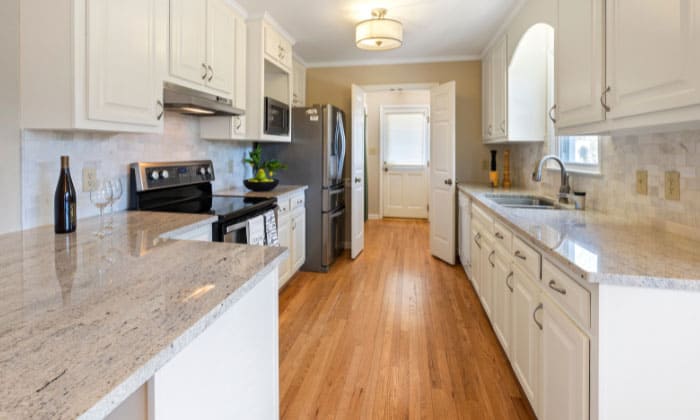
To keep your quartz countertop clean and shiny for longer periods of time, you’ll need to know a few common causes for dull spots on the material. Have a look at the list below:
- Continual exposure to direct sunlight will result in discoloration. This is due to the ultraviolet rays in the sun causing the polymers and resins in the countertop to react. This phenomenon is more observable in light-colored countertops.
- The heat from steaming cookware can also result in stains on quartz, as it breaks down the material’s protective laye Anything above 150℉ will damage the surface.
- Failing to clean up liquid messes will result in water stains, particularly if you live in an area with hard water.
- Quartz countertops are also vulnerable to highly acidic substances, given how resin can react with these chemica This is why we instructed you to dilute the vinegar with plenty of water first in the guide above.
- Food and drinks with deep pigments or dyes are likely to cause unsightly blemishes if not cleaned up immediately.
- You may have used the wrong cleaners on your quartz countertop. Bleach or ammonia, for example, is too abrasive for the material to handle. Likewise, pure vinegar should not be applied directly to surfaces made of quartz.
- In a similar vein, abrasive scrubbers will highly likely damage the quartz. Remember how we recommended that you only use a soft cloth to clean stains? This is the reason why.
- Improper maintenance and upkeep. For instance, if you constantly drag pots and pans across the stone surface, you’ll definitely scratch your countertop. These scuff marks will make your quartz look dull and rough.
How to Prevent It?
Now that you’ve learned the most popular reasons behind dull spots on quartz, it’s time to learn preventative measures:
- Keep your quartz countertop out of direct sunlight. If this is not possible, at least use cleaning products with UV protection properties.
- Never place anything hot on the quartz surface, regardless of whether they’re under 150℉ or not. If you have to do so, remember to place the hot item on a heat-resistant pot coaster
- Use water softeners to treat hard water. Consider buying a home test kit to determine if water is truly the issue.
- Clean up as soon as food and drinks spill on your countertop, particularly if they’re acidic or contain food dyes. You can pick one of the methods mentioned above to ensure the area is spotless.
- Only use suitable cleaners for quartz. Never use anything too acidic or alkaline. Products with pH-neutral formulas would be the best options.
- Use microfiber cloths and plastic scrapers when cleaning quartz surfaces. Do not scrub them with hard metal objects, including cookware.
FAQs
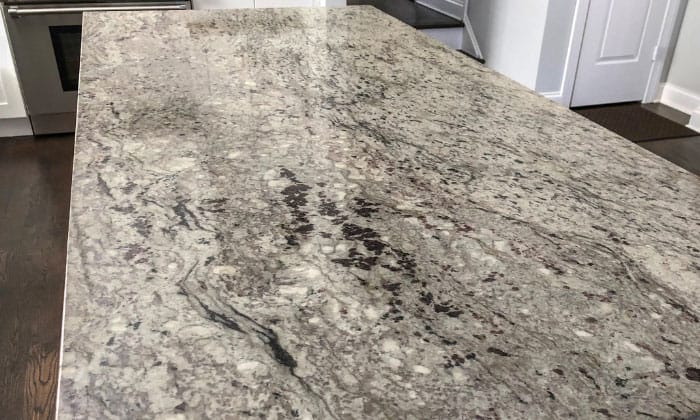
Can quartz countertops be buffed?
To cut the long story short: yes, they can. Common methods include polishing with warm soapy water, specialized quartz cleaners, and glass cleaners.
It’s also possible to buff light scratches on countertops with polishing compounds and a buffing pad. However, note that this is no easy job, as overdoing it can do more harm than good, such as melting away the resin in the quartz.
Can you use Dawn dish soap on the quartz countertop?
Yes, as long as the soap is a mild detergent, you can use it on quartz countertops. In fact, I highly recommend that you use a mixture of Dawn dish soap and water every day after you’re done with the cooking. This will keep your stone surface shiny for longer.
Conclusion
Now that you’ve learned how to fix dull spot on quartz countertop, I hope you know what to do with unsightly imperfections. Hopefully, they’re not so severe that you’ll have to call for the help of a professional to refinish the entire surface.
Let us know how our tips work out for you. Do you have any other ways to tackle cloudy patches on quartz countertops? Let us know in the comment below.
The post How to Fix Dull Spot on Quartz Countertop (6 Ultimate Ways) appeared first on Arthitectural.
